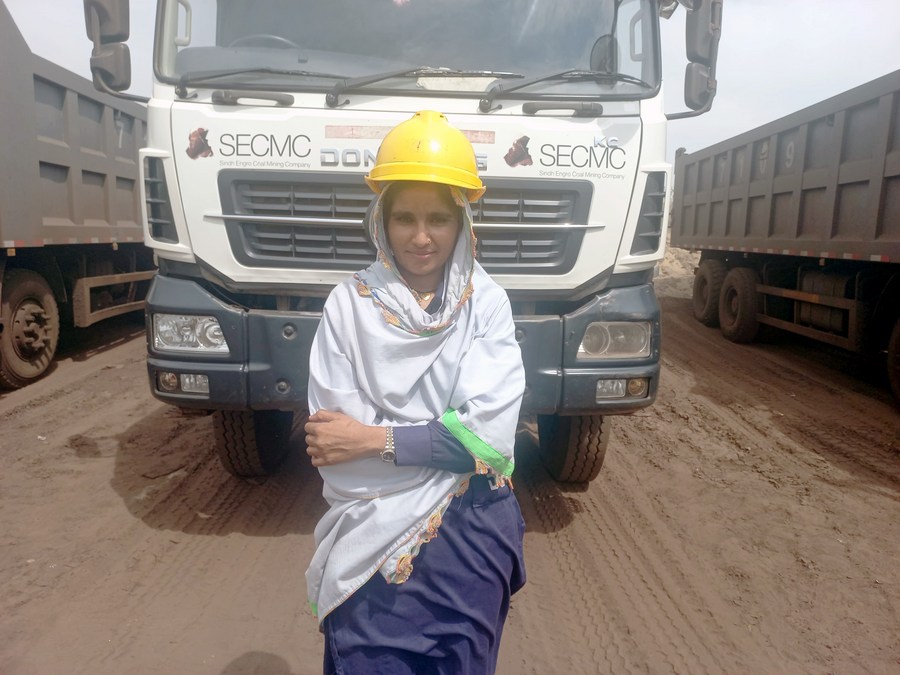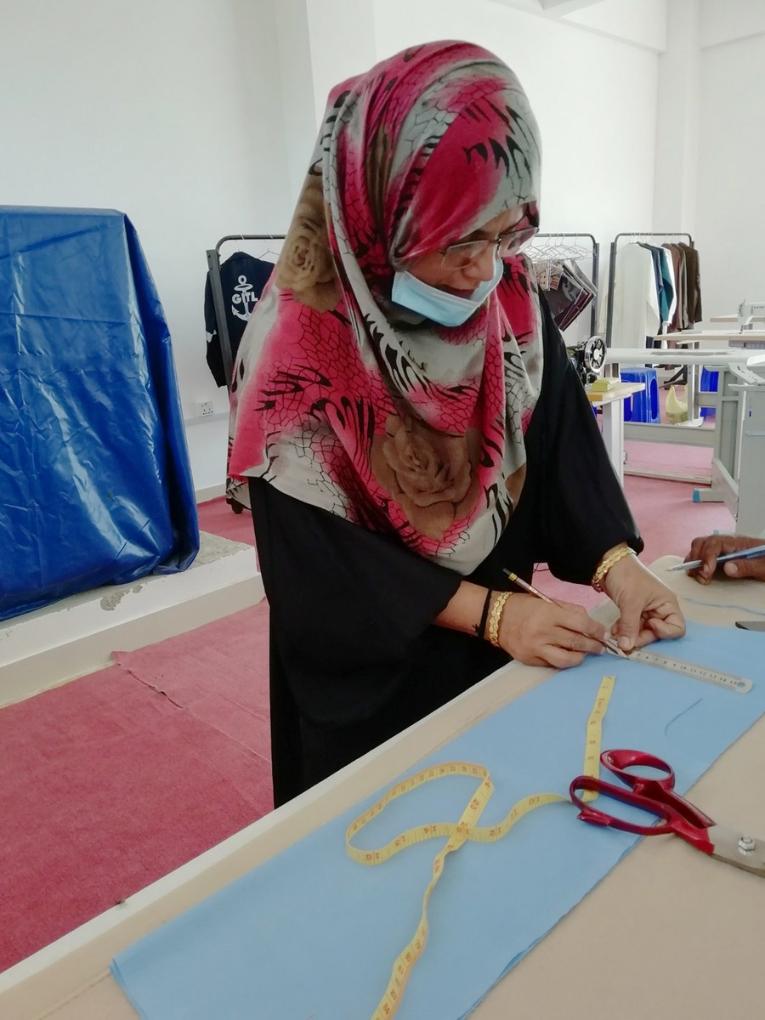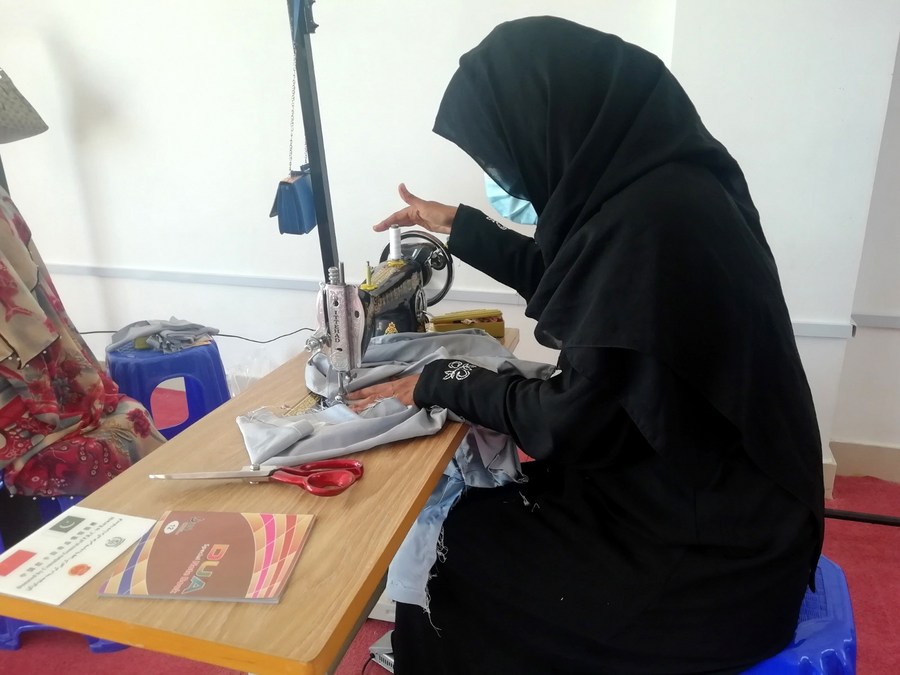CPEC empowers Pakistani women through socio-economic progress, professional growth

Rani Kolhi, a professional dump truck driver, poses for a photo in south Pakistan's Sindh province, March 8, 2024. (Thar Coal Block-II Coal Electricity Integration project/Handout via Xinhua)
Pakistani women break barriers and seize opportunities for empowerment, career development, and financial independence through working on projects under the China-Pakistan Economic Corridor.
by Misbah Saba Malik
ISLAMABAD, March 10 (Xinhua) -- Adeela Rehman works as a human resource manager in Thar Coal Block-II Coal Electricity Integration project with her Pakistani and Chinese colleagues to play a part in the development of her country.
In talks with Xinhua, Rehman said that she got an equal opportunity as men to showcase her professional skills and make a mark, adding that the project not only enhances her managerial skills but also positions her as a beacon of empowerment for women in her community.
The project, located in the remote Thar district of Pakistan's south Sindh province and built by China Machinery Engineering Corporation, has a major power plant under the China-Pakistan Economic Corridor (CPEC) to help the country meet its electricity demands by using locally available coal.
"During my work experience at the project, I found that empowering women resonates deeply with CPEC as it provides good opportunities for skillful women to pursue their dreams and break through societal barriers," Rehman added.

A woman works at Pak-China Technical and Vocational Institute in southwest Pakistan's Gwadar, March 8, 2024. (Pak-China Technical and Vocational Institute/Handout via Xinhua)
Launched in 2013, CPEC, a flagship project under the China-proposed Belt and Road Initiative (BRI), is a corridor linking Pakistan's southwest Gwadar port with Kashgar in northwest China's Xinjiang Uygur Autonomous Region, highlighting energy, transport, and industrial cooperation.
On International Women's Day, Rehman, along with hundreds of women linked directly or indirectly with CPEC in Pakistan, was celebrating her empowerment, socio-economic advancement, and professional growth arising from economic cooperation between the two countries.
Zaitoon Abdullah, a prominent female social activist from Gwadar, is greatly impressed by opportunities offered to local women through CPEC's vocational training center.
Women in Gwadar are skilled at basic stitching and sewing, but they haven't had many chances to use them because of limited opportunities in the area, Abdullah, head of the training center, told Xinhua.
"The training center established under CPEC aims to empower these talented but underprivileged women by offering them a platform to enhance their skills and utilize them for financial benefits," she said.

A woman works at Pak-China Technical and Vocational Institute in southwest Pakistan's Gwadar, March 8, 2024. (Pak-China Technical and Vocational Institute/Handout via Xinhua)
In its initial phase, the center focused on producing uniforms for employees of Chinese companies. Equipped with modern machinery, the center is poised to evolve into a garment factory, wherein locally crafted dresses will be distributed and sold throughout Balochistan province.
Abdullah said that women who were previously earning meager incomes from home-based work are now able to secure substantial earnings, and are contributing significantly to their families' financial well-being.
CPEC's Thar Coal Block-II Coal Electricity Integration project also provided local uneducated women farmers an opportunity to break stereotypes by incorporating them in a skilled workforce after a six-month rigorous training as dump truck drivers.
Rani Kolhi, a mother of three, defeated hunger and distress by standing up for herself and her kids to be a professional dump truck driver, a job many strong men in her area hesitated to do.
"I knew it would be challenging to stand up against stereotypes, but CPEC acted as a driving factor to help me recognize my worth and strength. The journey was hard, and I had to face skepticism from the society and challenges both on professional and personal fronts, but I believed in success, and today working as a senior driver I am not only financially independent but also a source of inspiration for other women," Kolhi told Xinhua.


